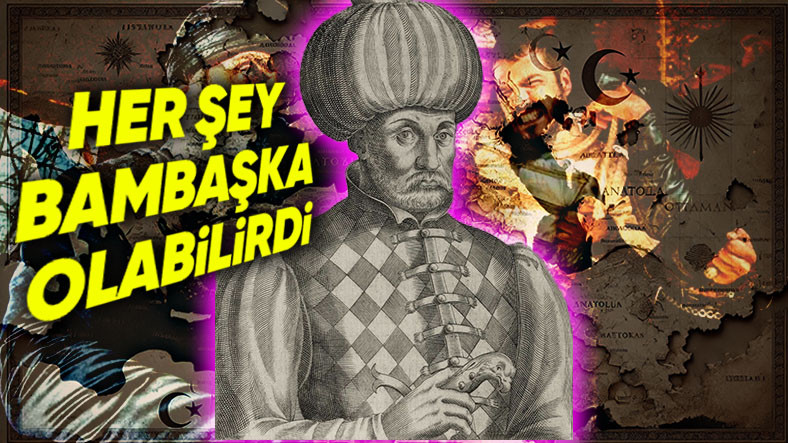That dark night for artificial intelligence, In the heart of Sultan Suleiman We asked what would have been different if some other feeling had been aroused, instead of greed and fear.
Prince Mustafa What if he decided to give him another chance instead of having him executed? Perhaps Ottoman history would take a very different direction…
How did it all start?

On August 6, 1515, Prince Mustafa, the son of Suleiman the Magnificent of Mahidevran Sultan, From the moment he was born, he was considered the most powerful heir to the Ottoman throne. He attracted attention with his courage, leadership qualities and military success from his young age; he became a beloved figure among the public and the army.
Over time, these features of his began to appear as a shadow on his father, Suleiman the Magnificent. Mustafa, the heir to the throne, is not only responsible for his father; It also attracted the attention of many powers within the state. However, intrigues in the palace determined the fate of Prince Mustafa. Suleiman the Magnificent Hurrem SultanHe wanted his sons Selim and Bayezid to become sultans, so Mustafa’s presence was a big obstacle for him.
Taking advantage of her powerful position, Hürrem Sultan prepared a plan with Grand Vizier Rüstem Pasha, one of the most trusted names of Suleiman the Magnificent.

Rustem Pasha, He believed that Prince Mustafa was planning a rebellion against his father. He began to spread rumors. Suleiman the Magnificent was deeply saddened and suspicious by this news. Even though he had a great love for his son Mustafa, he could not allow any situation that would endanger his throne and empire.
One of the most tragic events of the empire This is said to have happened for this reason. In 1553, Prince Mustafa, who had been invited to the army headquarters at Konya Ereğlisi, was strangled there on the orders of his father.
What if such a powerful prince had become the head of state?
Let us imagine that Prince Mustafa was pardoned by his father and proclaimed heir to the throne. After his return from the Konya expedition in 1553, the prince returns with his father to Istanbul and settles in the palace as befits his principality. When the people learn that Mustafa has been pardoned, they celebrate in the streets. The young prince’s justice, courage and leadership qualities are now on everyone’s lips.
Suleiman the Magnificent, his son Mustafa He takes him along and begins to give him lessons in government. Mustafa quickly adopts what he has learned from his father and is increasingly involved in state affairs. The other princes, who seem to have fallen out of favor with their father, are forced to accept this situation; because it is now clear that Mustafa is the true heir to the throne.
When Suleiman the Magnificent died after a long reign, Mustafa ascended the throne in all his glory.

Known as Sultan Mustafa I The new sultan immediately set in motion a series of reforms. One of his first acts was to purge the state of palace intrigues and unjust influences. As Hürrem Sultan’s power waned, Rüstem Pasha was removed from the position of grand vizier; a statesman trusted by Mustafa was to be appointed in his place.
Mustafa built on the solid foundations laid by his father. Works to further strengthen the Ottoman Empire, Revolts in various parts of the empire were suppressed, the economy was revived, and peace negotiations were initiated with Iran, especially on the eastern border.
The reign of Sultan Mustafa could have been a second golden age for the Ottoman Empire.

His honest administration and closeness to his people further increased the love of the people and the soldiers for him. Mustafa raised the intellectual level of the empire with educational reforms; The state could adopt a management style based on merit. As in the time of his father, During the reign of Mustafa the state wascould have reached its cultural peak.
In this process Mustafa’s brothers would also pose no threat to him. Because Sultan Mustafa would place his brothers in important places of the state and establish a peaceful relationship with them. This could be a big step towards ending the battles for the throne.
In the area of foreign policy, relations with Western Europe would be strengthened.

Thanks to the agreements with the Habsburgs Peace was established in the West, and peace treaties signed with the Safavids on the eastern border strengthened the power of the Ottoman Empire in the east.
Prince Mustafa, not only defense; it also attached importance to conquests, while strengthening the Ottoman presence in North Africa and restoring naval supremacy in the Mediterranean. These military victories of Mustafa could once again prove his leadership qualities.
Not executing Mustafa could have radically changed the history of the Ottoman Empire and opened the doors to a longer lasting and stronger empire. However History is written with facts, not with probabilities. The tragic end of Prince Mustafa thus caused the fate of the Ottoman Empire to evolve in a very different direction…
However, the unrest, unrest, riots and intrigues in the state after his death caused the Ottoman Empire to weaken.

He ascended the throne in place of Mustafa II. Selim throughout history “Drunk Selim” It was mentioned. Selim could not show strong leadership like his father, Suleiman the Magnificent, and was equally ineffective in government. Since the execution of Prince Musfata, who was regarded as a ‘hero’ by the people, was seen as unfair, it was inevitable that confidence in the sultan and the palace would falter.
All this, of course, caused a pause in the state. Art and literature, which reached their peak during the reign of Suleiman the Magnificent, It began to decline after the assassination of Mustafa, and artistic and literary activities in the palace declined. II. During the reign of Selim, interest and support for court artists declined; this slowed down the development of Ottoman art.
Mustafa’s death, While it intensified the struggle for the throne, it also caused the members of the dynasty to distrust each other. This “distrust” and the feeling of not being united, which accelerated the collapse of the Ottoman Empire, gradually paved the way for the degeneration of the state.
Our other content that may interest you:
Follow Webtekno on X and don’t miss the news



















